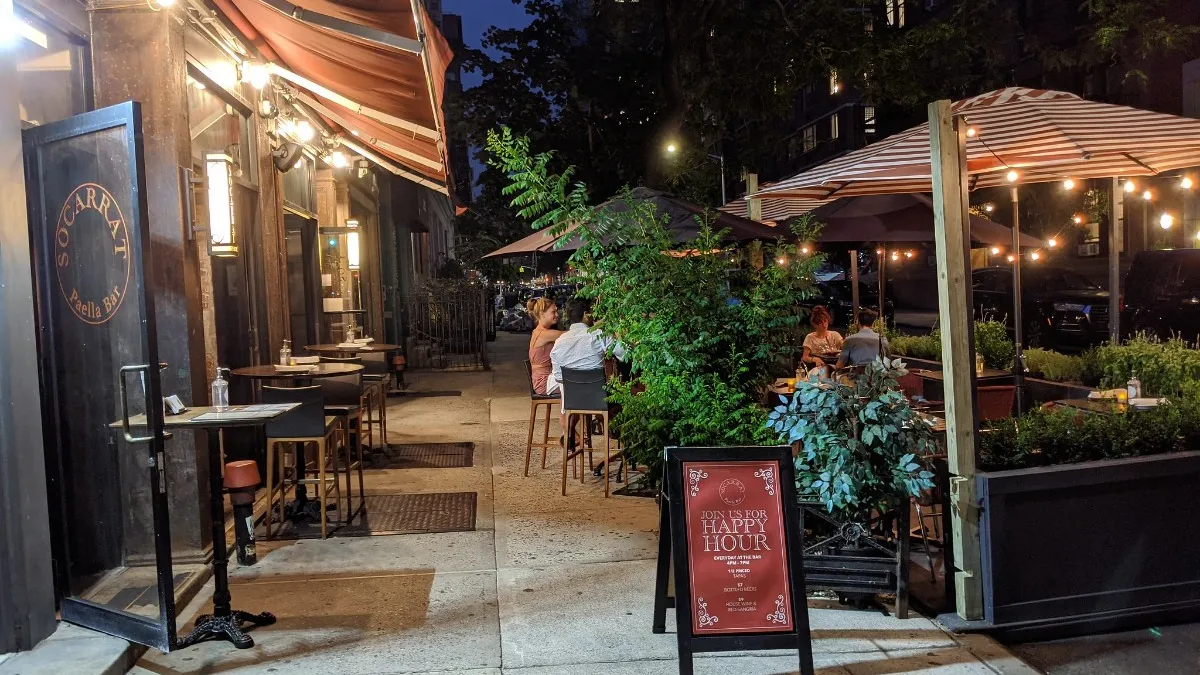Dive Brief:
- The New York City Council approved an ordinance on Wednesday that would allow restaurants to add a surcharge of up to 10% to diners' bills as a way to help them recover from lost sales during the COVID-19 pandemic. The bill will be in effect until 90 days after indoor dining at full capacity is permitted.
- The surcharge can go toward helping a restaurant in any way an owner chooses except gratuity for employees, according to the New York Hospitality Alliance. Operators must call the surcharge a "COVID-19 Recovery Charge," disclose the amount of the surcharge on the menu and bill and must make clear in written terms the charge will not go toward gratuity.
- Andrew Rigie, executive director of the New York Hospitality Alliance, said in a statement that the bill will give New York City restaurants "a fighting chance of survival." There is some opposition to the bill, including from One Fair Wage, which notes the surcharge could cut into tips, Eater reports.
Dive Insight:
In early August, a report from the NYC Hospitality Alliance found that 83% of businesses in the city couldn't pay full rent in July, underscoring just how hard the market has been hit by the COVID-19 crisis. New York City boasts the most restaurants, coffee shops and specialty-food stores in the U.S. and may therefore be disproportionately affected by mass restaurant closures. According to Yelp, 17% of the business closures listed on its app as of July were restaurants.
A 10% surcharge won't likely be a silver bullet for New York City restaurants, but it can provide another revenue lifeline. Because owners have the discretion to spend these revenues in any way they like, aside from wages and tips, restaurants could for example put funds from the surcharge toward cold weather-proofing outdoor dining areas.
The question is whether or not consumers will be willing to tack on a COVID-19 surcharge. A July NBC News article notes that consumers are split on such fees, particularly as they pop up everywhere from medical visits to hair salons. It could be especially challenging to get diners in New York City on board, since the area was grappling with a 20% unemployment rate as of July.
Surcharges aren't a new concept. San Francisco have one to cover the impact of climate change surcharge while Los Angeles has one to cover employee healthcare costs, for example. In May, Lettuce Entertain You Enterprises added a 4% fee for delivery and carryout orders,Restaurant Business reported. The publication also noted that according to Technomic, only 31% of consumers feel coronavirus surcharges at restaurants are "acceptable" and 32% would go to a different restaurant rather than pay such a surcharge.
However, as restaurants continue to navigate a challenging environment without the ability to operate at full capacity in many markets, consumers might be singing a different tune now. A recent survey by the National Restaurant Association found that 89% of customersare worried about the future of local restaurants, meaning they may perhaps be more willing to cover a surcharge as the pandemic stretches on if it provides a boost.
In New York City, this bill is the city's latest attempt to provide restaurants a tailwind. Also this week, de Blasio announced the Open Streets: Restaurant program is extending its temporary street closures for outdoor dining to weekdays. The city also just moved to allow 25% indoor dining capacity and, late last month, city officials expanded the timeline of its 20% cap on delivery commission fees, first put into place in May, until 90 days after restaurants can open their dining rooms to full capacity.
Notably, the idea of adding a surcharge to New York City restaurants' tabs isn't new either. In its first iteration introduced two years ago, more than 200 restaurants supported a bill that added a 5% fee to offset rising costs like rent. That bill never gained the support necessary from de Blasio to pass, but the mayor has said he supports this latest update due to the "unprecedented emergency" of the pandemic, a spokesperson for the mayor told Eater.









